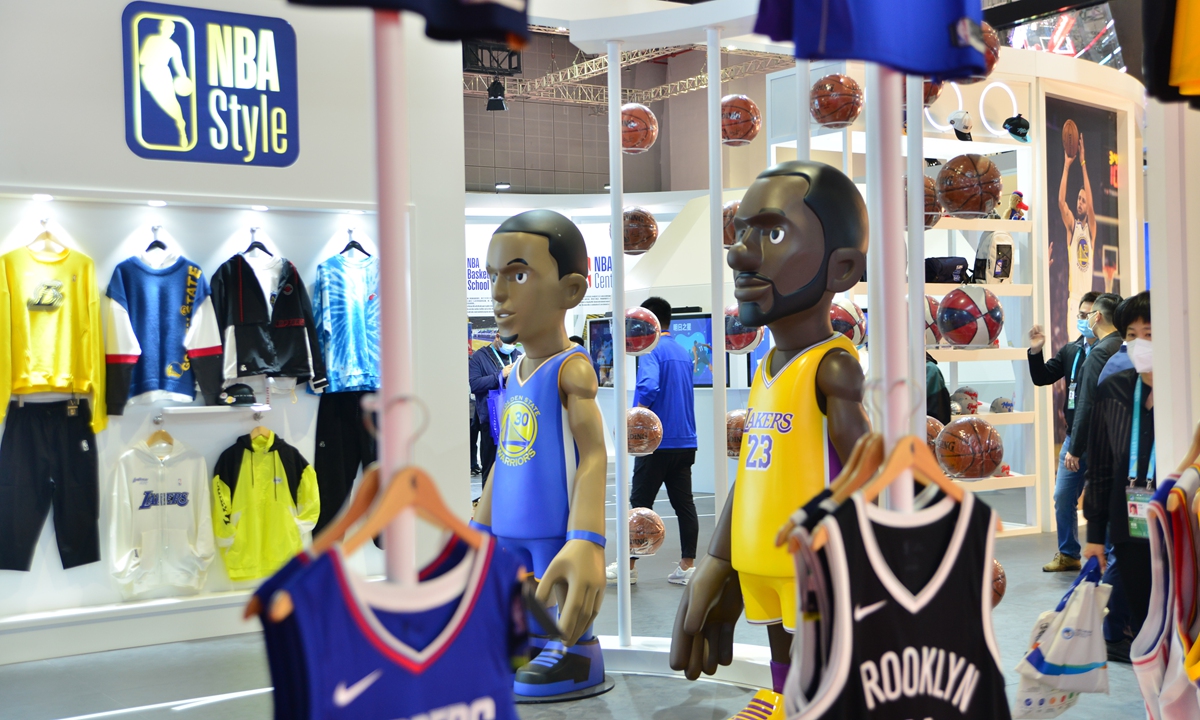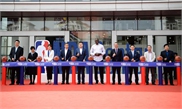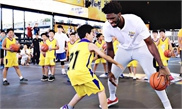
The NBA exhibition zone at the China International Import Expo 2020 in Shanghai Photo: VCG
Over the last couple of years, Jiao Huayi, a digital media producer with NBA franchise Memphis Grizzlies, has put in a lot of effort to make her team more popular in China.
Thanks to her contributions, including inviting Chinese artist Zhou Rui to give a sand drawing performance to introduce the Grizzlies' history to Chinese audiences, the name of the team, which are not as popular in China as teams such as the Los Angeles Lakers and the Golden State Warriors, has been spreading throughout China.
The number of followers to the team on China's Twitter-like Sina Weibo has increased by more than 1 million in a single year.
For a while Jiao was a little worried that her work might be impaired by assaults from malicious US politicians amid rising China-US tensions.
"I was worried in the beginning," Jiao told the Global Times. "But thanks to the [Grizzlies] team's commitment to the Chinese audience, I have shaken off that anxiety."
Several US politicians are accusing the NBA of "putting profit ahead of principles" as China remains the biggest overseas market for the world's top-tier basketball league.
Although NBA games have yet to return to state broadcaster CCTV after an inappropriate tweet from then Houston Rockets general manager Daryl Morey led to their removal, basketball fans in China can still watch games through Chinese streaming platform Tencent.
Separately, US Major League Baseball was also targeted by US politicians earlier in April, after it penned a new broadcasting deal with Tencent while deciding to move its All-Star Game from Atlanta due to a local voting rights issue.
This political pressure has had an impact. For instance, MLB China postponed a scheduled interview with the Global Times aimed at promoting baseball among younger generations in China due to the "sensitivity of this period."
The icebreaker
Historically speaking, sports have had a role to play in international relations, such as acting as a bridge to overcome adversarial relations during the Cold War in the 1970s.
Earlier in April in Shanghai, veteran Chinese and US table tennis players commemorated the 50th anniversary of ping-pong diplomacy, which led to the establishment of bilateral ties.
"Part of the glamor of sports is that it can create connections among different people so they can learn about different cultures," Jiao told the Global Times.
"I will spare no effort if basketball can help restore bilateral ties between the two countries."
Wan Xin, a senior producer with ESPN, echoed Jiao's thoughts that sports can be a bridge that connects the two countries through non-governmental channels.
"When there is a bridge, no matter if the weather is sunny or gloomy, people can still connect with each other through this bridge," Wan told the Global Times.
But while ping-pong diplomacy acted as an icebreaker in the 1970s, what must be done now is to "warm up the water that has been cooled down," Wan noted.
"From a sports media perspective, the better content we are offering to audiences on both sides will help local people understand what is really happening on the other side of the world."
Li Li, who works in youth basketball operations for WNBA team the Los Angeles Sparks, has also dedicated himself to contributing more to his team, regardless of what the politicians are saying.
"My goal is to continue to contribute to the team," Li told the Global Times, noting the politicians are accusing China for personal motives.
"As the US is witnessing a rise in hate crimes against Asians, we should also take the opportunity to express our voice for equal respect and treatment."
Still hot
The stories of basketball ace Yao Ming, volleyball legend Lang Ping as well as tennis trailblazer Li Na have enjoyed wide popularity in the US, and now a new generation of athletes such as skier Gu Ailing, better known as Elieen Gu in the US, and mixed martial artist Zhang Weili are starting to fill their boots.
"When we report inspiring stories about Chinese athletes, it gives people in the US an opportunity to get to know real Chinese people," Wan said.
He noted that Chinese audiences can still feel the heat of the US' popular NCAA games, including the prominent "March Madness," thanks to livestreaming, which has made it possible for Chinese to learn more about young people in the US.
"For sure there are people who look at China with prejudice, but when we provide good content that are beneficial to mutual understanding and exchanges, there is no basis for prejudice," Wan said.
Several others Chinese people working in the US sports organizations or subsidiaries have also expressed their worries and hope to contribute, but most of them declined to be identified, fearing speaking publicly will lead to cyber bullying or hamper their career prospects.
"It requires communication for people in different cultures to understand each other," Jiao told the Global Times. "If we can have more Americans understand Chinese culture and China's stance through our work, they can have their own judgment no matter the nonsense of politicians."



